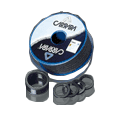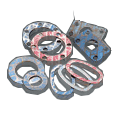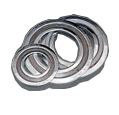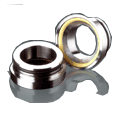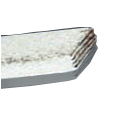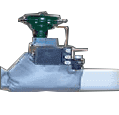Gaskets. They come in so many different shapes, sizes, materials and are used for a whole bunch of different purposes. With the vast range of gaskets available, it can be tricky to choose the right gasket material for your application. The last thing you want is to be using the incorrect gasket material on a piece of equipment that costs tens of thousands of dollars, if not more!
But that’s what Steamline Engineering is here to help you with in this post. As Australia’s gasket experts, we’ve outlined an ultimate guide to choosing the right gasket material, keeping your equipment happy and healthy!
Metallic gaskets
Let’s start off with metallic gaskets – one of the main subcategories of gasket, along with semi-metallic and non-metallic. Metallic gaskets are used for high-temperature and high-pressure applications, where non-asbestos products generally fail. They’re also excellent for applications that involve extreme chemical exposure, proving durable and solid under chemical attack. They’re commonly used in flanges, compressors and offshore oil and gas pipelines.
Graphite gaskets
Graphite gaskets are one of the most utilised non-metallic gasket in the world. They’re used in numerous industries where high-resistance gaskets are necessary. Some of the main characteristics of graphite gaskets include high-temperature resistance, high-pressure tolerance, chemical attack resistance, and fire-safe design.
PTFE gaskets
PTFE is a highly sought-after gasket material, due to its resistance to chemical attack, and performance under high-pressure and high-temperature environments. PTFE gaskets are used several different industries, commonly found in electrical applications, food, beverage and pharmaceutical equipment, petrochemical and chemical processing and more. They can resist temperatures of up to 260 degrees Celsius.
Graphite gaskets create a reliable seal under a moderate bolt load, as they’re malleable yet strong. However, they should not be substituted for applications which require the tensile strength of metallic gaskets.
Rubber gaskets
Rubber gaskets are characterised by their affordable cost, availability, flexibility, resistance to chemical attack, and suitability for applications involving water. Rubber gaskets can be very versatile. For example, they can be created harder to withstand higher-pressure environments, or softer to relieve compressive load exertion by the flange bolts that they’re mating.
Fibre gaskets
Fibre gaskets have several beneficial characteristics, such as high tensile strength and resistance to temperatures between 120 and 170 degrees Celsius. Made from vegetable fibre and cellulose fibre, these gaskets are incredibly resistant to oils, gasoline and other chemicals.
Ready to invest in the perfect, high-quality gasket? No matter which type of gasket you’re wanting to invest in, Steamline Engineering can help you out. We stock loads of gaskets from excellent manufacturers like Carrera and Firefly, providing rubber, PTFE, graphite and more. Supplying various gaskets from various materials, Steamline are also Australia’s leading team for other industrial equipment like thermal tapes and seals, welding blankets and valve packing materials.



